Magazine
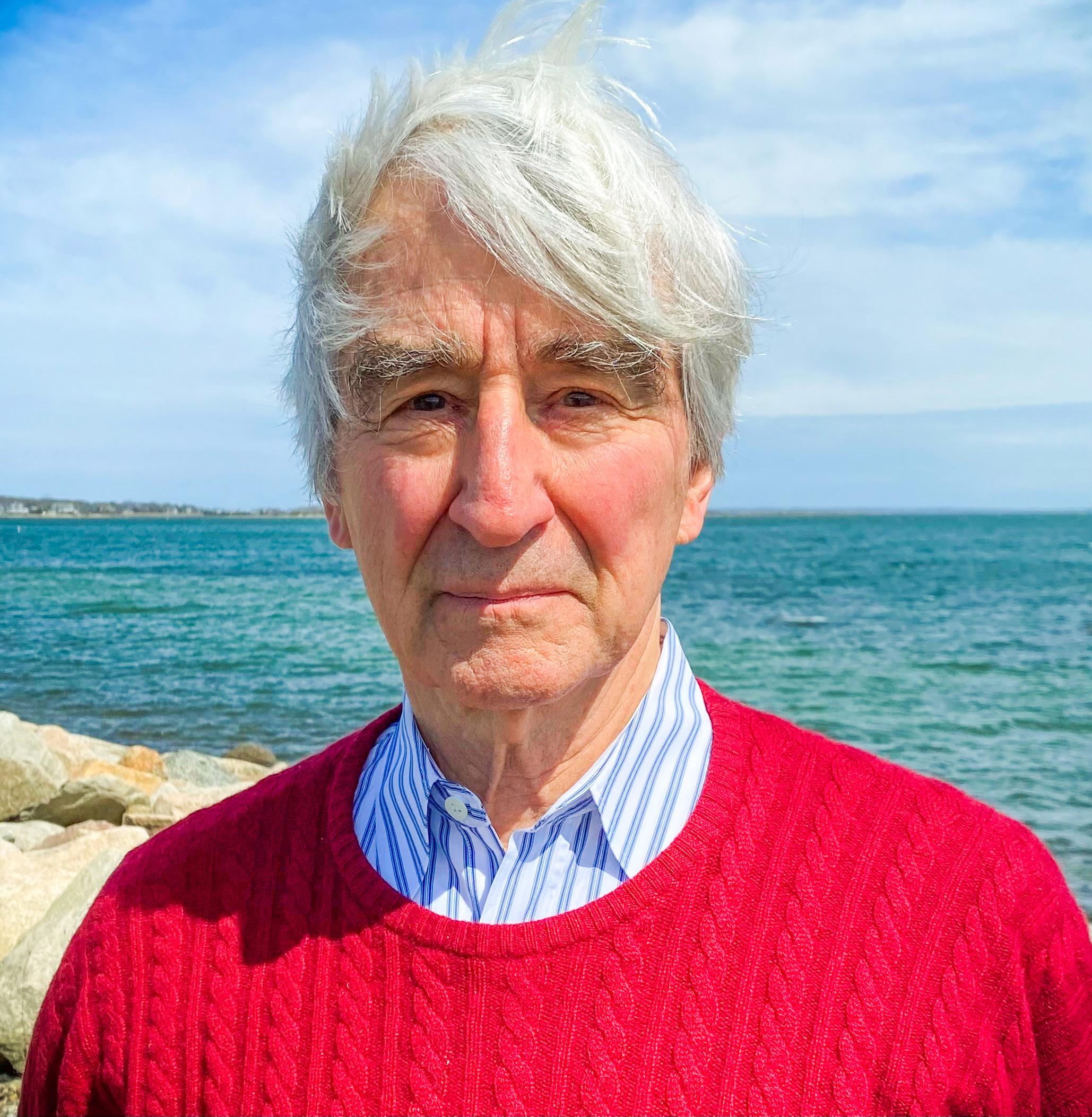
FALL 2022
Sam Waterston
Oceana’s Chairman hosts first in-person Board meeting since Covid-19
The Golden State enacts boldest plastic reduction policy in the nation
Meet Oceana’s new leader in Peru
OCEANA.ORG
California’s Bold Move Q&A with Daniel Olivares
© Sam Waterston
Board of Directors
Sam Waterston, Chair
María Eugenia Girón, Vice Chair
Diana Thomson, Treasurer
James Sandler, Secretary
Keith Addis, President
Gaz Alazraki
Herbert M. Bedolfe, III
Ted Danson
Nicholas Davis
Maya Gabeira
César Gaviria
Loic Gouzer
Jena King
Ben Koerner
Sara Lowell
Kristian Parker, Ph.D.
Daniel Pauly, Ph.D.
David Rockefeller, Jr.
Susan Rockefeller
Simon Sidamon-Eristoff
Rashid Sumaila, Ph.D.
Valarie Van Cleave
Elizabeth Wahler
Jean Weiss
Antha Williams
Editorial
Interim
Ocean Council
Susan Rockefeller, Founder
Kelly Hallman, Vice Chair
Dede McMahon, Vice Chair
Anonymous
Samantha Bass
Violaine and John Bernbach
Rick Burnes
Vin Cipolla
Barbara Cohn Ann Colley
Edward Dolman
Kay and Frank Fernandez
Carolyn and Chris Groobey
J. Stephen and Angela Kilcullen
Ann Luskey
Mia M. Thompson
Peter Neumeier
Carl and Janet Nolet
Ellie Phipps Price
Maria Jose Peréz Simón
David Rockefeller, Jr.
Andrew Sabin
Elias Sacal
Regina K. and John Scully
Sutton Stracke
David Treadway, Ph.D.
Edgar and Sue Wachenheim III
Valaree Wahler
David Max Williamson
Raoul Witteveen
Leslie Zemeckis
Oceana Magazine is published by Oceana, Inc. For questions or comments about this publication, please call our membership department at +1.202.833.3900 or write to Oceana’s Member Services at 1025 Connecticut Ave. NW, Suite 200, Washington, DC 20036 USA.
Oceana Staff
Andrew Sharpless
Chief Executive Officer
Jim Simon President Jacqueline Savitz Chief Policy Officer
Kathryn Matthews, Ph.D. Chief Scientist
Matthew Littlejohn
Senior Vice President, Strategic Initiatives
Janelle Chanona Vice President, Belize
Ademilson Zamboni, Ph.D. Vice President, Brazil
Joshua Laughren
Executive Director, Oceana Canada
Liesbeth van der Meer, DVM Vice President, Chile
Pascale Moehrle
Executive Director and Vice President, Europe
Renata Terrazas Vice President, Mexico Daniel Olivares Vice President, Peru
Gloria Estenzo Ramos, J.D. Vice President, Philippines Beth Lowell Vice President, United States Nancy Golden Vice President, Global Development Abbie Gibbs Vice President, Institutional Giving Dustin Cranor Vice President, Global Marketing and Communications
Susan Murray
Deputy Vice President, U.S. Pacific
Vera Coelho
Senior Director of Advocacy, Europe
Christopher Sharkey
Chief Financial Officer
Kathy Whelpley
Chief of Staff, President’s Office
Michael Hirshfield, Ph.D.
Senior Advisor
Oceana’s Privacy Policy: Your right to privacy is important to Oceana, and we are committed to maintaining your trust. Personal information (such as name, address, phone number, email) includes data that you may have provided to us when making a donation or taking action as a Wavemaker on behalf of the oceans. This personal information is stored in a secure location. For our full privacy policy, please visit oceana.org/privacy-policy.
Staff
Editor Gillian Spolarich Designer Alan Po Contributing Writer Emily Petsko Please Recycle.
FSC Logo
Features Contents
Note
the
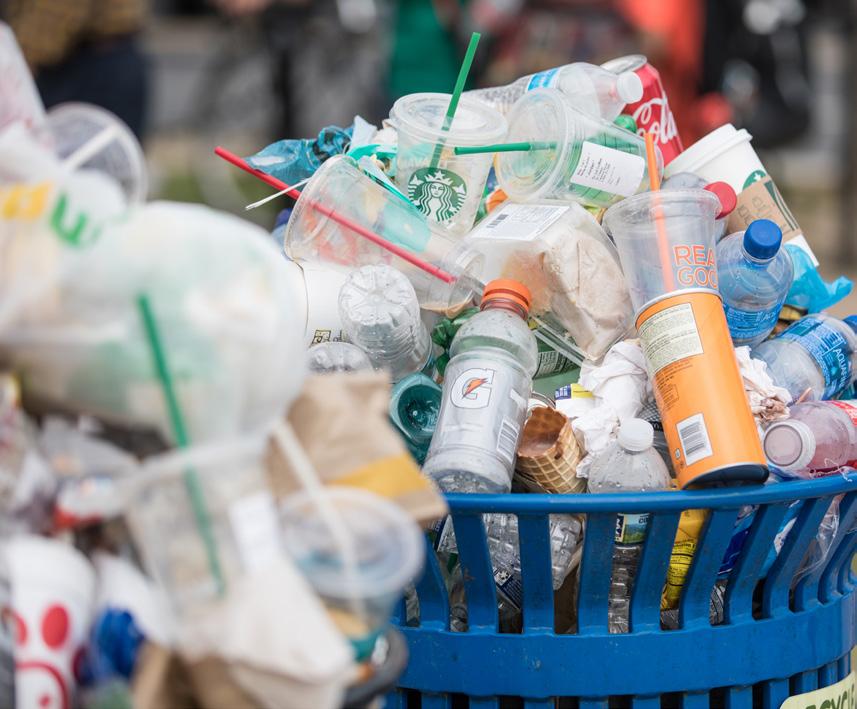
safeguards in
McAllister retires from Oceana’s Board,
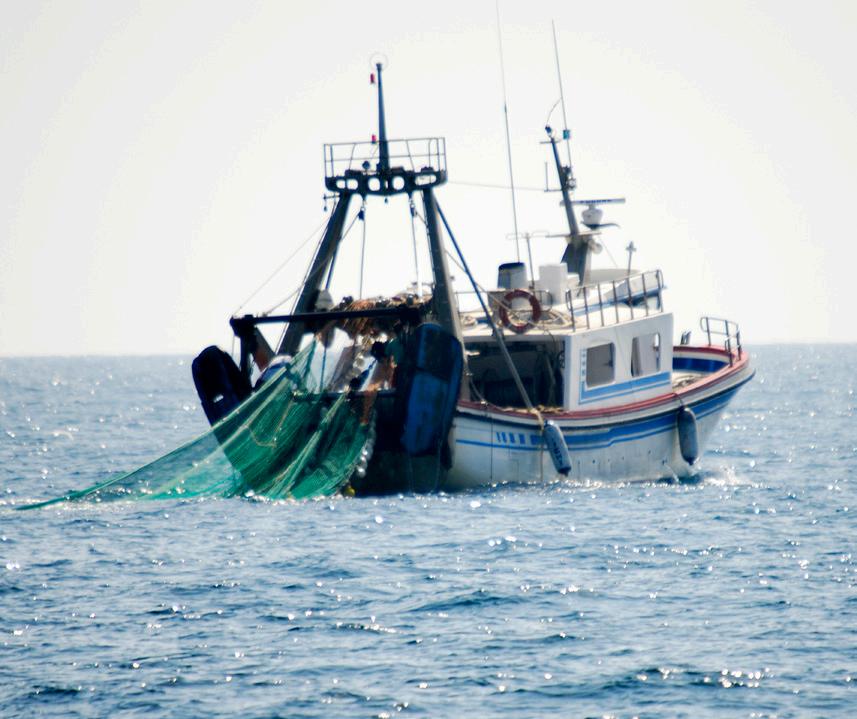
Oceana
Meet Daniel Olivares, Oceana’s
leader in
audits in Belize
Park’
To help navigate Oceana’s work, look for these six icons representing its major campaigns: Curb Pollution Protect Habitat Increase Transparency Protect Species Stop Overfishing Reduce Bycatch CEO
Oceana’s steady delivery of policy victories is helping to provide an abundant and biodiverse ocean 3 | 4 | For
Win New legal
Canada will rebuild fisheries abundance and more 6 | News & Notes Stephen
and
completes fisheries
and Brazil Q&A
new
Peru 8 | 10 | California’s Bold Move to Curb Plastic Pollution A new law will reduce single-use plastics in the state 14 | The ‘Paper
Paradox Oceana’s campaign to ban destructive fishing gear in every MPA in the EU 21 | Supporter Spotlight The Becht Foundation is creating a more sustainable future 22 | Ask Dr. Pauly Why are plastics in the ocean so harmful? 20 | Oceana’s Victories Looking back at Oceana’s big wins over the last year Events Our Ocean conference 24 | Events Oceana’s Board of Directors meeting and reception in Los Angeles 25 | Chef’s Corner Fiona Lewis shares a recipe for fresh shellfish salad 26 | Parting Shot Sea lions sunbathe in Pisagua, an area Oceana is campaigning to protect in Chile 28 | A new law in California will require companies to reduce their single-use plastic packaging and foodware. Oceana is campaigning to ban bottom trawling in Europe’s marine protected areas. 10 14 1 © Shutterstock/Nokuro © Oceana/Juan Cuetos
Your support makes an ocean of difference
us
at
email us at info@oceana.org, visit oceana.org/give, or use the

in
Oceana is a tax-exempt 501(c)3 organization and contributions are tax-deductible to the fullest extent of the law.
to make a

Call
today
+1.202.833.3900,
envelope provided
this magazine
donation.
Please Give Generously Today A healthy, fully restored ocean could feed more than 1 billion people each day, forever.
© Oceana/Juan Cuetos
CEO Note

If you read just one page of this issue of the Oceana Magazine, turn to page 20. It is in our steady delivery of policy victories, always in partnership with allies, where we show that our country-by-country approach to ocean conservation is working. We are helping to deliver an abundant and biodiverse ocean for the future.
This issue also brings an informative piece on ocean plastics by Dr. Daniel Pauly, one of the world’s most distinguished ocean scientists, along with news about California’s new law that will help protect the state against exponentially growing pollution from single-use plastics. California Governor Gavin Newsom’s signature on Senate Bill 54 just a few weeks ago will reduce single-use plastic packaging and foodware across the state by at least 25% over the next decade. California – which if it were a country, would be the fifth largest economy in the world – is leading the way in the essential task of stopping plastic polluters. This is good news.


Our feature on “paper parks” exposes the fact that most of the marine protected areas in Europe do not restrict bottom trawling, a highly destructive form of fishing in which weighted nets are dragged along the ocean bottom. With our allies, Oceana has made huge progress in most of the countries where we operate protecting key habitat from destructive bottom trawling, but European policymakers are overdue for action on this problem. While we press the European Union to act, the United Kingdom has an opportunity to lead following Brexit. An analysis by Oceana in 2021 revealed that the UK allowed potentially destructive fishing in all but two of the 64 offshore areas it had designated as protected. Thanks to the generosity of the Becht Foundation and a growing list of donors, we will soon stand up a full campaign team whose job will be to win an end to paper parks in UK waters by 2026.
The article on paper parks also presents an example of our continued partnership with Global Fishing Watch, which Oceana co-founded several years ago with SkyTruth and Google. Many trawlers are trackable by satellite, so when they fish inside marine protected areas, their presence is
recorded and published freely to the world on the Global Fishing Watch map. We are using this information to press policymakers for action. Oceana’s Chief Policy Officer Jacqueline Savitz and I serve on the board of directors of Global Fishing Watch, which is thriving under the leadership of its CEO Tony Long, formerly a commander in the Royal British Navy. Transparency deters illegality – a key element in delivering a global impact for ocean conservation.
Thank you for your continuing support of Oceana. Your support powers our campaign teams, who are winning policies that deliver ocean abundance and biodiversity.
Sincerely,
Andrew Sharpless CEO Oceana
FALL 2022 | Oceana.org3
© Oceana/Juan Cuetos
For the Win
The Coca-Cola Company makes global pledge to reduce single-use bottles and increase refillables
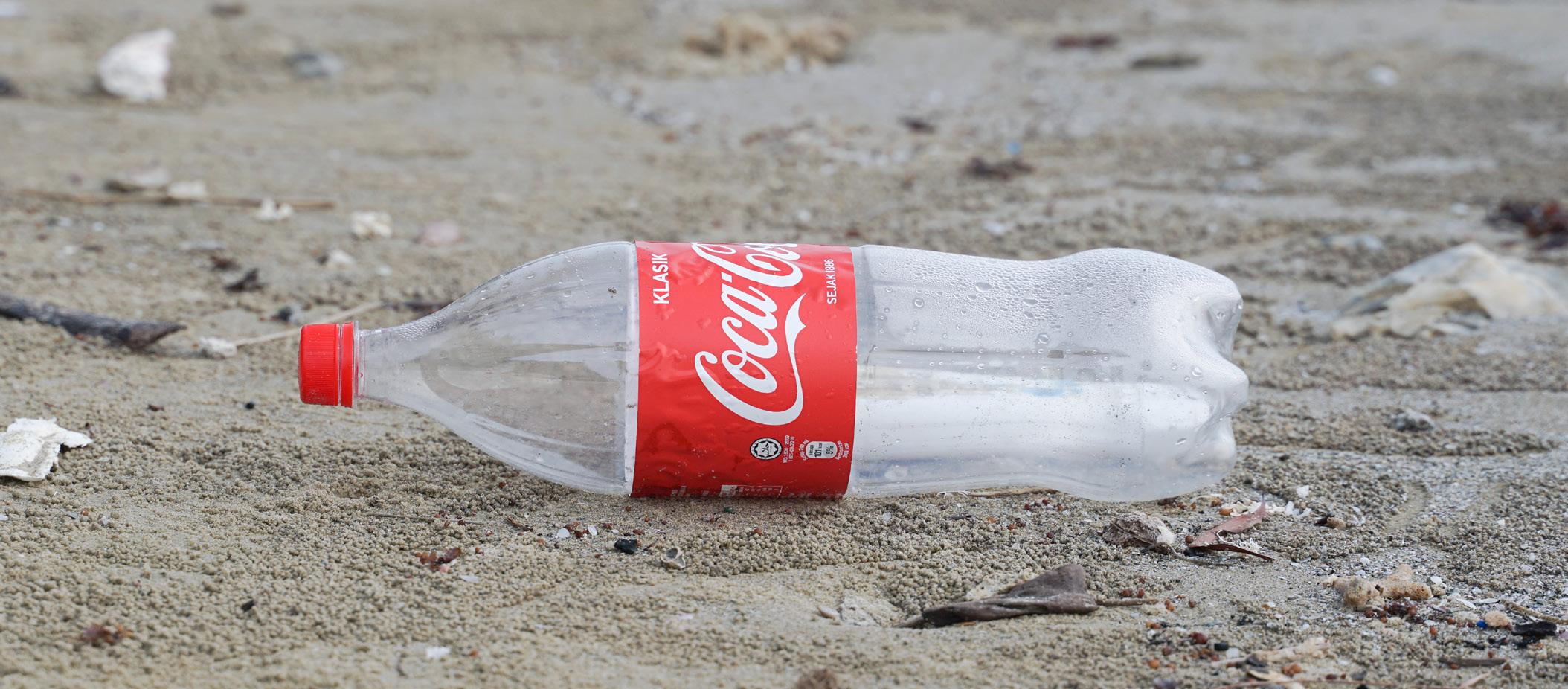
The Coca-Cola Company made a global, public commitment to sell 25% of its products in reusable packaging by 2030 – up from an estimated current share of 16%. This includes refillable bottles, which are the primary form of reusable packaging. If met, the pledge could take the equivalent of 1 billion single-use plastic liter bottles out of the ocean every year. Coca-Cola sells one out of every five soft drinks globally and is the world’s top plastic polluter, according to a Break Free From Plastic report.
This decision follows Oceana’s campaign for beverage companies to embrace refillables and reduce singleuse plastic bottles. Refillables, made from both polyethylene terephthalate plastic (PET) and glass, are used 20 to 50 times and are essentially all returned and collected by the companies, as opposed to singleuse plastic bottles, which are used once and disposed of. An Oceana analysis found that just a 10% increase in the market share of refillable bottles in all coastal countries could keep up to 7.6 billion plastic bottles out of the ocean each year. In addition, PepsiCo, another top plastic polluter, recently committed to making its own reusable goal by the end of this year.
Canadian government sets new legal safeguards to rebuild fish stocks
In a major victory for the future abundance of Canada’s wild fish, the Canadian government will legally require its fisheries to be rebuilt. Oceana Canada and its allies advocated for robust requirements to guide the recovery of Canada’s fish populations, of which less than a third are considered healthy. Thirty stocks are listed in the new regulations, which require rebuilding plans to set a target, timeline, and action to rebuild the stocks. Healthy fish populations contribute to healthy coastal communities and a more abundant ocean. These regulations fall under the Fisheries Act, which Oceana successfully strengthened in 2019.
Canada also recently protected two critically depleted species – Atlantic mackerel and Southern Gulf spring herring – by closing the commercial and bait fisheries. Oceana Canada advocated for fishery rebuilding measures to be implemented and called for the closure of both fisheries. Atlantic mackerel and Southern Gulf spring herring play a crucial role in the Northwest Atlantic ecosystem and feed many other species, including whales, seabirds, and commercially important stocks such as cod and tuna.
4
Following campaigning by Oceana, Coca-Cola committed to sell 25% of its products in reusable packaging by 2030, including refillable bottles. If met, this pledge could take 1 billion single-use plastic liter bottles out of the ocean every year.
© Shutterstock/Fazly Marijal
U.S. state of Maine rejects permit for harmful fish farm
Following campaigning by Oceana and its allies, Maine’s government rejected the Norwegianbased company American Aquafarms’ permit, halting construction of a potentially harmful fish farm for at least a few years. The site, located in Frenchman Bay near the shoreline of Acadia National Park, would be the largest ocean-pen salmon farm in North America. If built, it could have polluted Maine’s pristine waters and marine ecosystem with more than 4 billion gallons of wastewater every day. This area draws in millions of tourists each year, generating hundreds of millions in revenue for the state annually. The proposed fish farm threatened the economy and those who rely on the bay for food, jobs, and a cherished way of life. Oceana is continuing to campaign to defend Frenchman Bay and Maine’s coastal waters.
Spain curbs ocean-polluting single-use plastics through new Waste Law
Following campaigning by Oceana and its allies, Spain adopted a new Waste Law that incorporates the European Union SingleUse Plastics Directive into national law, helping to reduce ocean-bound plastic pollution. Oceana advocated for the new law to go beyond the minimum requirements set by the EU, including newly adopted measures that will: establish a basis for future depositreturn schemes; reduce single-use plastics in public administration facilities; make plastic producers accountable for covering the costs of beach clean-ups; and enable municipalities to ban mass balloon releases and smoking on beaches. While Oceana continues to campaign for additional prohibitions, the new law represents a key first step toward further action by Spain to reduce single-use plastics.

A national agency in the Philippines issued an order to better protect the ocean and local communities from harmful land reclamation projects along the coast. Dubbed “dump-and-fill,” these development projects can threaten marine biodiversity, hurt fisherfolk and food security, and remove natural buffers — such as mangroves — that protect communities from waves and typhoons. In February, the Department of the Interior and Local Government determined that all projects by local governments
must comply with the Philippine Environmental Impact Assessment System Act, Fisheries Code, and other environmental laws before they are approved. This decision is a direct result of campaigning by Oceana and its allies, who drew national attention to dumpand-fill projects that were being approved without proper environmental assessments and compliance with legal requirements.
New requirements will strengthen accountability and abundance of groundfish fishery in Northeast U.S.
The United States government approved a final rule that requires all fishing in the New England groundfish fishery to be accompanied by professionally trained at-sea monitors or electronic systems to gather firsthand data about what is being caught and discarded at sea. Oceana and its allies campaigned for years for greater observer coverage levels for this fishery, which has suffered from decades of overfishing and excessive uncounted bycatch. This change is critical for the proper oversight of the 13 species in this fisheries management plan and will ensure that catch is accounted for so that sciencebased catch limits can be properly set and enforced.
FALL 2022 | Oceana.org5 5 FALL 2022 | Oceana.org
The Philippines government protects marine ecosystems and fisherfolk from harmful coastal development projects
A machine dredges at a “dump-and-fill” site in Manila Bay in the Philippines. Oceana is campaigning to stop projects like these that threaten marine biodiversity, hurt fisherfolk, and remove natural buffers like mangroves.
© Oceana/D. de Jesus
© Oceana/D. de Jesus
News & Notes
Nearly half of Amazon shareholder votes support resolution calling on company to address its plastic pollution problem
An Amazon shareholder resolution asking the e-commerce giant to address its growing plastic packaging problem received 48% support. It received 181 million votes – the most of any of the multiple resolutions considered at the company’s annual meeting. Without opposing votes from Amazon insiders, including Jeff Bezos, this resolution would have passed. Oceana was instrumental in winning support for the resolution from Amazon’s employees (who are also company shareholders) at its headquarters in Seattle, Washington and Arlington, Virginia. The campaign featured photos of ocean animals eating or being covered by ocean plastic along with the headline “AMZN: Less plastic, please.” This effort included canvassers, mobile billboards,
yard signs, posters, and a LinkedIn campaign. Oceana found that in 2020, Amazon produced 599 million pounds of plastic packaging waste – a 29% increase in just one year.

Though technically required, there is no public, nationwide system for the ongoing collection of fish landings data, or regular monitoring of catch composition by species and size. Oceana is calling for a substantial improvement in transparency that includes robust data collection, which can help set sounder science-based policies.
To restore ocean abundance, we must first know the status of a country’s fisheries. In the last few months, Oceana has examined the fisheries in Belize and Brazil and prepared recommendations for improvements.
In Belize, Oceana released its first Fishery Audit, which found information was lacking for most of the 54 commercially fished marine stocks in Belize, making it difficult to know whether stocks are being properly managed or overexploited.
In Brazil, only half of the 48 fisheries analyzed are covered by an official landing monitoring program. There is also little information and reliable data to determine whether species are overfished and the status of 94% of the local fish stocks are unknown. Some of the recommendations Oceana is making, based on the audit findings, include modernizing the country’s fisheries law, developing management plans for fisheries, expanding fisheries monitoring, and establishing science-based catch limits.
6
Prior to Amazon’s annual meeting, Oceana was on the ground outside of Amazon’s headquarters in Seattle, Washington with mobile billboards calling on the company to reduce its plastic pollution footprint.
© Oceana
Oceana completes fisheries audits in Belize and Brazil
Stephen McAllister retires from Oceana’s Board of Directors
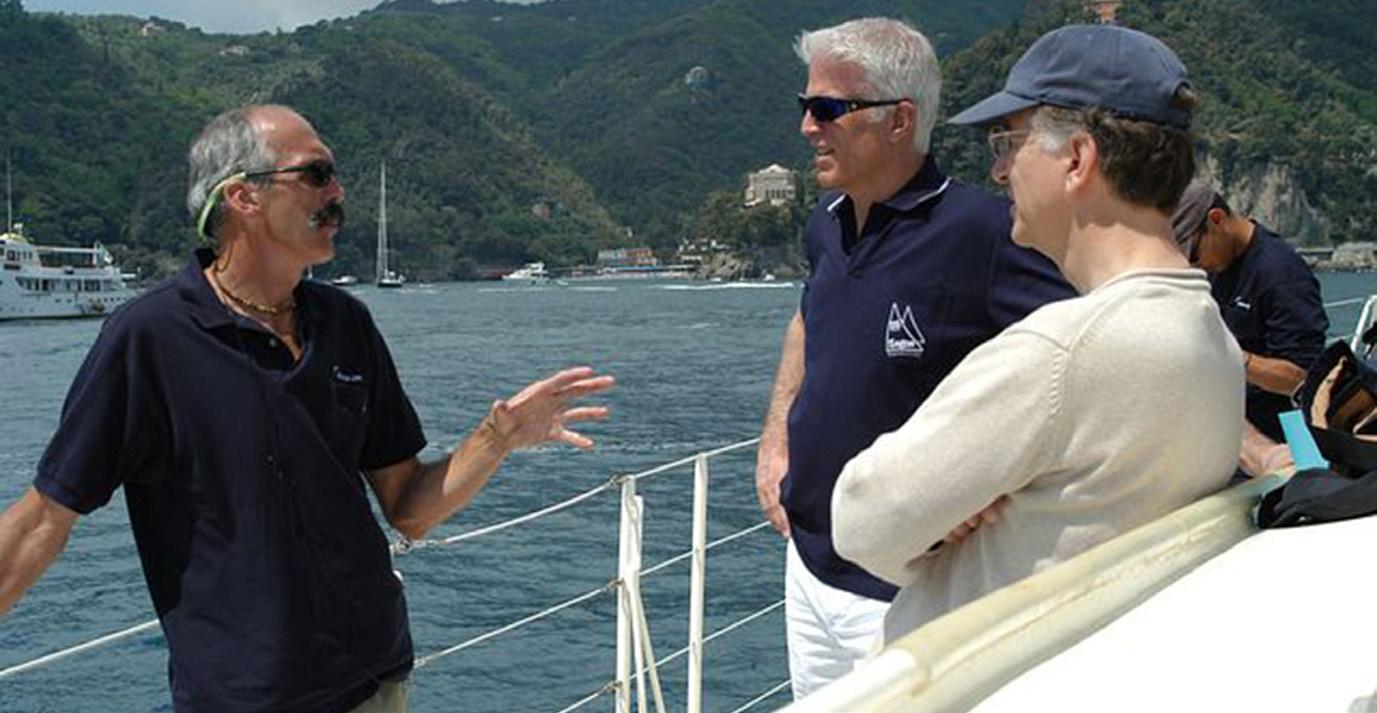
After nearly 20 years of service, Stephen McAllister is retiring from Oceana’s Board of Directors. Prior to joining Oceana’s Board, McAllister was the executive director of Greenpeace Australia and the deputy executive director and campaign director of Greenpeace International at its headquarters in Amsterdam. He is also a successful businessman in the U.S. state of Maryland.
McAllister has left his mark on Oceana in innumerable ways, including in 2005, when he generously donated the use of the Ranger catamaran to Oceana. Since then, the Ranger has carried out 14 expeditions in European waters, allowing Oceana to gather critical information for its campaigns to protect marine habitats and species, and to improve sustainable fisheries management. This information has led to significant victories, ranging from the designation of new marine protected areas in Malta, Portugal, and Spain, to actions to curtail the illegal use of driftnets, a highly destructive form of fishing gear.
The Ranger is still sailing today – most recently to the Alboran
These sanctions came after the U.S. negatively certified Mexico in 2021 for failing to take concrete action against small vessels or ‘lanchas’ fishing illegally in the U.S. Gulf of Mexico waters. Many of the vessels accused of illegal fishing were using prohibited long lines to catch red snapper. Long lines are a type of fishing gear where a single fishing line, sometimes more than 20 miles long, is suspended in the water or set along the seafloor with baited hooks and that can catch a variety of marine life unintentionally, including sea turtles, dolphins, sharks, and whales.
Sea in June 2022, where Oceana researchers documented evidence of plastic pollution on the seafloor and the impacts of destructive bottom trawling inside marine protected areas meant to safeguard marine life.
“Oceana is at sea thanks to Steve. He knew that we needed to be on the water; that it would drive us to make the science behind necessary habitat protections vividly real to policymakers,” said Andrew Sharpless, Oceana’s CEO. “Thanks to Steve, we now have completed more than 50 expeditions worldwide. His contribution is a key reason we have habitat protections and other conservation policy outcomes in all of the countries in which Oceana campaigns.”
Red snapper is a prized commercial and recreational fishery in both the U.S. and Mexico waters, and important to both countries’ economies. The U.S. fish population is rebuilding thanks to catch limits and management of unintended catch, but the fishery now attracts illegal fishing. In its biannual report to the U.S. Congress published in 2021, the National Oceanic and Atmospheric Administration stated there were a total of 287 lanchas suspected of illegal fishing in 2018, 2019, and 2020.
U.S. closes ports to Mexico after repeated illegal fishing
In February, the United States officially closed its ports to Mexican fishing vessels in the Gulf of Mexico after repeated instances of illegal fishing in U.S. waters. These vessels are currently prohibited from entering U.S. ports and from receiving any port services.
These instances of illegal fishing hurt honest fishermen and other workers in Mexico and the U.S. who play by the rules. They also contribute to overfishing and the decline in health of Gulf of Mexico waters. According to Oceana’s fishery audit in Mexico, an estimated four out of 10 fish species in Mexico are overexploited, including red snapper. Oceana, along with its allies helped the Mexican fisheries agency develop a traceability proposal in 2019, which would allow for boat-to-plate traceability, but the agency has yet to move it forward. Oceana is pressing the Mexican government to remedy the sanctions and ensure responsible fisheries management.
FALL 2022 | Oceana.org7
Oceana Board Members Stephen McAllister and Ted Danson, and CEO Andrew Sharpless on board the Ranger in the Mediterranean. May 2006.
© Oceana/Cory Wilson
Q+A
Meet Daniel Olivares, Oceana’s new leader in Peru

Until recently, you served in Peru’s Congress. How was that experience? What were your priorities as an elected representative?
Daniel Olivares is a seasoned advocate and communicator. Prior to joining Oceana, he served as an elected representative for Lima in Peru’s Congress. While there, Daniel championed important causes, including the environment and affordable housing, successfully bringing legislation into law. Before being elected to Peru’s Congress, Daniel was the head of digital communications for Prime Minister Fernando Zavala, where he led a large team charged with effectively communicating the government’s work to the people of Peru and coordinating communications efforts across all federal ministries. Daniel originally co-founded COPILOTO, a communications and PR agency dedicated to social impact issues, which is now one of the leading independent communications agencies in Peru.
DO: When I finished my term as congressman, many wondered if I was relieved to no longer be in politics. But I actually really enjoyed working in Congress and loved representing the people of Lima. In fact, if reelection were permitted in Peru, I would have definitely run again. My priorities centered around securing citizens fair access to transportation and fighting for the rights of those with disabilities. But my main objective was to be in all the places where our citizens did not have access. To be present – that’s what I wanted to see in my representatives, so that’s what I did when I was in Congress.
Social media played a big part in your past political campaigns. How do you see that helping you in your new role at Oceana?
DO: Before becoming a congressman, I was a communications advisor for politicians. The funny thing is that when I became a politician, I broke almost all the rules I used when advising my clients. I followed my instinct according to what I felt the country, and especially my
constituents, required from me. It was all about connection and accountability. Now at Oceana, I’m working to inject that same sense of awareness to our team, especially on social media. Windows of opportunity to connect with our audience are getting smaller and smaller, so we must take advantage of them whenever we can.
What drew you to Oceana?
DO: Not even Tinder could have made a better match. I joke, but when I finished my job in the public sector, I was wondering how I could continue to be helpful to my community. It just so happened Oceana was looking for a new leader at that same exact time. Now I’m learning everything I can about what we need to do to protect our ocean and trying to be as useful to my team and my country as possible. I love it.
You joined Oceana in January, just shortly before an estimated 12,000 barrels of oil polluted Peru’s ocean. What was the impact of the Repsol oil spill and how did Oceana respond to this disaster?
DO: I was only in my second week at Oceana when the Repsol oil spill happened. The first thing we decided to do was to mobilize our
8
© Alonso Molina
team on the ground. We were immediately at the scene of the spill, listening and communicating with the public about what was happening, and how the company was misleading the community about the impacts of the spill. It sounds simple, but the result was very powerful for Oceana. We were the leaders in defending our marine ecosystem from the beginning and that gave us a newfound responsibility. The impacts of the disaster, both environmental and economical, are still being measured to this day. We are continuing to collaborate with our partners to ensure that these measurements are accurate and used to hold the company and government accountable. We are also keeping the conversation alive in our local communities and in the media so the impact of this spill is not forgotten. A disaster like this must never be allowed to happen again.
What Oceana campaign in Peru do you wish more people knew about?
DO: We are campaigning to preserve the first five miles of the Peruvian coast exclusively for small-scale, artisanal fishers. This area is full of life and critically important to sustainable artisanal fishing. But industrial fishers and large companies are competing for this same space and threatening the very existence of our local fishing communities. From my first trips to the Peruvian coast, I learned that this area must be protected, or the livelihoods of thousands of artisanal fishers could disappear. One way or another, we
are going to win this campaign. It’s just too important.
You co-founded COPILOTO, a leading communications and PR agency in Peru dedicated to social issues. How can strategic communications help Oceana achieve its campaign goals in Peru?

DO: For me, communications is everything. There is no good policymaking without communications.
What is the most urgent issue facing Peru’s oceans? How should we address it?
DO: The biggest problem facing Peru, not only in our ocean but
in general, is impunity. Noncompliance with the law. While we continue to improve our laws, we must also ensure they are enforced. For example, when you ask artisanal fishers about their main concerns, they talk about the lack of compliance with the laws we already have, or about insufficient oversight at sea. In Peru, there’s a lot of talk about the need to strengthen education to better coexist. I 100% agree. But education is only one of two necessary pillars - the other is penalties. Education and penalties are two sides of the same coin necessary to change behaviors. Laws, as I studied in school, are agreements invented for us to live in social peace. That peace is the first step to function as a society.
FALL 2022 | Oceana.org9
For me, communications is everything. There is no good policymaking without communications.
© Alonso Molina
California’s Bold Move to Curb Plastic Pollution
 By Emily Petsko
New law will reduce single-use plastic packaging and foodware in state by at least 25% over the next decade.
By Emily Petsko
New law will reduce single-use plastic packaging and foodware in state by at least 25% over the next decade.
10 © Shutterstock/Jaru Photo
Feature
The state of California has the largest population and fifth longest coastline in the United States. Its economy is so productive that, if it were a country, it would be the fifth largest in the world, ahead of the United Kingdom, India, and France. Consequently, it also has a big plastic pollution problem. The California Department of Resources Recycling and Recovery estimates 4.5 million tons of plastics entered the landfills in 2018.
Plastic waste that ends up in the environment, including the oceans, also comes with a hefty price tag for clean-up. Taxpayers across the Golden State have been spending $420 million annually to help clean up and prevent plastic and other waste from polluting their rivers, streams, beaches, and oceans.
But on June 30, California legislators made a bold decision to aggressively tackle its plastic pollution problem at the source, in large part by holding plastic producers responsible for the waste they create. Following campaigning by Oceana and its allies, Governor Gavin Newsom signed the Plastic Pollution Prevention and Packaging Producer Responsibility Act (Senate Bill 54) into law with bipartisan support. This law — the strongest of its kind in the nation — gets to the root of plastic pollution by requiring
companies to reduce their singleuse plastic packaging and foodware by at least 25% over the next 10 years. Ocean Conservancy, one of the non-profits Oceana worked with to pass the bill, estimates the new law will eliminate 23 million tons of plastic waste in the next decade, which is equivalent to about 26 times the weight of the Golden Gate Bridge.
Christy Leavitt, Oceana’s Plastics Campaign Director, said given the size and importance of California’s economy, this law could set the standard for future plastic reduction policies.
“California has boldly raised the bar for reducing single-use plastic,” Leavitt said. “California’s effort to aggressively tackle plastic pollution at the source and require companies to make a meaningful shift from throwaway plastic to reusable and refillable alternatives sends a strong signal to the nation, and the world.”

It also shifts some of the financial burden of plastic pollution from citizens to the plastics industry and establishes an environmental mitigation fund. Plastic producers will pay $5 billion into this fund over the course of a decade, helping to offset the harmful impacts of plastic on the environment and Californians —
Recycling alone will not solve the ocean plastic pollution crisis
Scientists estimate that 33 billion pounds of plastic wash into the ocean every year. That equates to about two garbage trucks’ worth of plastic entering the ocean every minute.
While the plastics industry argues that recycling is the solution, only 9% of all the plastic waste ever generated has been recycled. In the United States, the recycling rate dropped below 6% in 2021. With plastic production expected to triple in the next three decades, so will the amount of plastic entering oceans, coastlines, and communities.
Oceana is campaigning globally to enact policies that curb the production and circulation of unnecessary single-use plastics, and by persuading major companies to offer plasticfree alternatives. If plastics are significantly reduced at the source, less plastic waste will enter the oceans, where it poses a grave threat to marine life.
FALL 2022 | Oceana.org11
California’s effort to aggressively tackle plastic pollution at the source and require companies to make a meaningful shift from throwaway plastic to reusable and refillable alternatives sends a strong signal to the nation, and the world.
– Christy Leavitt, Oceana’s Plastics Campaign Director
© Shutterstock/savitskaya
iryna
particularly those in underserved, low-income, and rural communities who have been disproportionately affected by pollution from the manufacturing and disposal of plastics.
“This new law will finally require companies that produce plastic to pay to help solve the pollution problem they are creating,” said Oceana’s Chief Policy Officer Jacqueline Savitz. “The industry has been puffing up its profit margin with cheap packaging and pushing the costs off to communities, local governments, and the environment. We have finally begun to force those costs to be internalized, which will help us turn off the plastic packaging faucet, which has to be the first step in solving the problem.”
While many cities and several states have passed laws to phase out plastic bags, polystyrene foam containers, and other individual plastic items, California is the first state to pass a comprehensive source reduction law that targets all single-use plastic packaging and foodware. It will also implement the first reuse and refill mandates in the nation, helping the state
transition from a throwaway economy to one in which packaging is reused multiple times.
The passage of Senate Bill 54 reflects the will of citizens across the country. Polling by Oceana revealed that 81% of American voters support policies that reduce single-use plastic. That share is even higher in California, where 86% of voters said they wanted plastic reduction policies at the local and state level and 91% were concerned about plastic pollution and its impact on the environment.
In addition to ensuring that fewer single-use plastics will be made in the first place, Senate Bill 54 also requires all single-use packaging and plastic foodware to be recyclable or compostable by 2032. This means there will not only be a reduction in the amount of waste that has the potential to get to the ocean, but the remaining singleuse plastic items in circulation will have a much lower chance of ending up in the oceans, beaches, parks, and other natural places. While there will continue to be a need to reduce beyond the 25%
Plastic at
Oceana and its allies have won
Peru bans plastic bags and reduces plastic use in protected areas
U.S. state of Washington bans single-use plastic bags
U.S. state of New York bans plastic foam food containers and packaging
U.S. state of Virginia protects the oceans from polystyrene foam and plastic balloon pollution

Belize phases out single-use plastics and polystyrene foam food containers
U.S. state of Washington bans polystyrene foam and limits oceanpolluting singleuse plastic at restaurants

Feature
The new legislation in California will require companies to reduce their single-use plastic packaging and foodware by at least 25% over the next 10 years.
© Shutterstock/Komsan Loonprom
2018 2019 2020 2021 © Shutterstock/marcinm111 Reducing
the Source: Since 2018,
17 victories to reduce single-use plastics worldwide.
mandated in this new law, and to invest in tools such as regenerative agriculture to help reduce the worst impacts of pollution and climate change, this law represents a powerful step that other states, and even nations, can use to build their plastics reduction programs.
Before the California legislature voted on this precedent-setting law, Californian citizens were prepared to vote on a plastic reduction measure this November. Nearly 900,000 Californians signed their names to get the initiative on the ballot, which would have accomplished many of the same goals as Senate Bill 54. With the mission of reducing plastic pollution at the source achieved, the ballot initiative has since been withdrawn.
In addition to passing Senate Bill 54, California lawmakers have taken other steps to reduce the state’s reliance on singleuse plastics. In May, the State Assembly passed a bill to curb the rampant use of single-use plastic in e-commerce. If passed by the Senate and signed by the governor, the law will reduce the use of plastic film, cushioning, and other
More than 600 million pounds of plastic packaging waste was generated by e-commerce businesses, like Amazon, in the U.S. in 2020. A bill in the California state legislature could reduce this waste.

types of plastic packaging — much of which is not recyclable — in shipments of online orders from companies like Amazon. More than 600 million pounds of plastic packaging waste was generated by e-commerce businesses in the U.S. in 2020, and California leads the country in online shopping.
This also follows the passage of two other Oceana-supported laws in 2021: one that makes it easier to implement refillable glass beverage bottle systems in California, and another that requires single-use plastic items — including utensils and condiment packages — to be
provided only upon request for takeout and delivery orders.
Governor Newsom celebrated the passage of the newest law by stating, “Our kids deserve a future free of plastic waste and all its dangerous impacts, everything from clogging our oceans to killing animals — contaminating the air we breathe, the water we drink, and the food we eat. No more.
California won’t tolerate plastic waste that’s filling our waterways and making it harder to breathe. We’re holding polluters responsible and cutting plastics at the source.”
Chile enacts a new law that protects the oceans from single-use plastics and mandates refillables
Brazil’s leading food delivery service, iFood, commits to deliver plastic-free meals by 2025
U.S. state of California enacts two new laws to reduce single-use plastic waste
Coca-Cola makes global pledge to reduce singleuse plastics and increase refillables
2022
U.S. state of Maryland protects marine life from choking on balloons
U.S. state of Delaware protects marine life and coast from plastic balloon pollution
U.S. state of New York enacts law to reduce plastic pollution in hotels
U.S national parks are protected from single-use plastics
U.S. state of California enacts the boldest plastic reduction policy in the nation

Spain curbs ocean-polluting single-use plastics through new Waste Law
Canada eliminates the production, sale, and export of six oceanpolluting singleuse plastics
© Shutterstock/Hadrian
The ‘Paper Park’ Paradox
By Emily Petsko
Nearly all of the Wadden Sea is considered a marine protected area, yet bottom trawling – a highly destructive fishing method – is still permitted.

Feature
As European countries race to create marine protected areas, Oceana is campaigning to ensure these parks ban bottom trawling.
14 © Shutterstock/travelpeter
The Wadden Sea is a diamond in the rough. Bordering Germany, Denmark, and the Netherlands, it is home to seals, porpoises, about 50 species of wintering birds, seagrass meadows — and a whole lot of mud. Wadden means “mud flats” in Dutch, and many locals take meditative “mud walks” along the intertidal zone, which contains the world’s largest unbroken system of sand and mud flats.
These mud flats foster a rich array of life — from shellfish to flatfish — and play an important role in the “transitional zones” that connect land with freshwater, and land with sea. Because these unique features lend themselves to high biodiversity, almost the entire sea has been placed under a marine protected area (MPA) status. Much of this sea is also a World Heritage Site, with the United Nations Educational, Scientific, and Cultural Organization declaring its productivity to be among “the highest in the world.”
This productivity, however, is under threat. Using Global Fishing Watch satellite data from 2021, Oceana discovered the Wadden Sea MPA in German waters endured an estimated 22,000 hours of apparent bottom trawling, a fishing method that can destroy seabeds and kill vulnerable wildlife while dragging weighted nets across the ocean floor. The previous year, this MPA was the most heavily bottomtrawled of all of Europe’s protected waters.
The Wadden Sea is not an anomaly. A 2020 Oceana report titled Unmanaged = Unprotected: Europe’s Marine Paper Parks found destructive fishing methods, including bottom trawling, occur in 86% of the area specifically designated to protect seabed habitats in European MPAs.
“Marine protected areas, as the name suggests, are supposed to afford protection to marine life,”
Oceana found that over 2.5 million hours of apparent bottom trawling took place in EU marine protected areas in 2020. Oceana is campaigning to ban the destructive fishing method inside these marine parks.
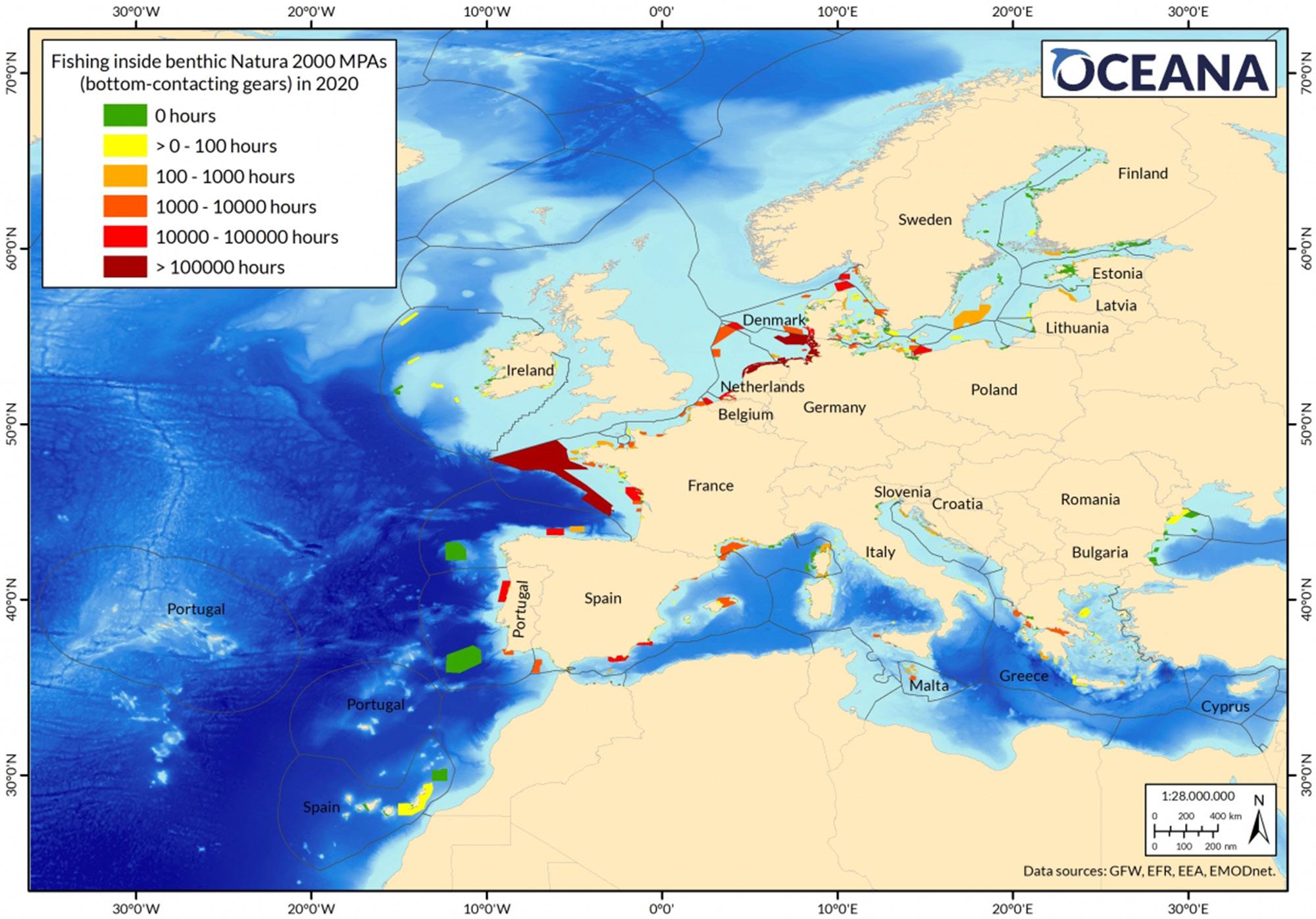
said Vera Coelho, Oceana’s Senior Director of Advocacy in Europe. “Yet in 2020, more than 2.5 million hours of apparent bottom trawling took place inside them. It is unacceptable that the EU continues condoning the destruction of the very places it has committed to protect.”
Studies show that MPAs promote ocean abundance when they are properly placed and managed. However, “paper parks” like the Wadden Sea fall short of this goal because they are protected on paper, but not in practice. To stop this worrying trend in ocean management, Oceana and its allies not only advocate for the creation of new MPAs in strategic locations, but also for stronger protections
and meaningful enforcement in existing MPAs.
Oceana is actively campaigning to ban bottom-towed fishing gear, including bottom trawls and dredges, in every MPA in the EU. Oceana has also ramped up its presence in the United Kingdom, where campaigners are working to protect the MPA network — which covers over 30% of UK waters — from these destructive forms of fishing gear.
While there is much work to be done in Europe’s MPAs, Oceana’s habitat victories in the EU and around the world show it is possible to enact and enforce strong protections for ocean ecosystems.
FALL 2022 | Oceana.org15
Studies show that MPAs promote ocean abundance when they are properly placed and managed. However, “paper parks” like the Wadden Sea fall short of this goal because they are protected on paper, but not in practice.
‘Placebo conservation’ benefits. Analyzing the results from multiple MPA studies, Dr. Enric Sala and Dr. Sylvaine Giakoumi found fish biomass in marine reserves is on average 670% higher than in surrounding unprotected waters.
Bottom trawling is detrimental to marine life. It can be compared to clear-cutting a forest because it bulldozes everything in its path, from sharks to stingrays to corals that can take centuries to regrow.
To date, Oceana and its allies have protected more than 10 million square kilometers (nearly 4 million square miles) of ocean habitat from threats such as bottom trawling. This includes banning bottom trawling in all of Belize’s waters, all of the Philippines’ municipal waters, all of the waters surrounding Chile’s seamounts, large pockets of U.S. and Canadian waters, and 4.9 million square kilometers (1.9 million square miles) of Northeast waters at depths of 800 meters (more than 2,600 feet) and below.
Places that prioritize MPA enforcement often see biodiversity

Another paper by Dr. Sala, coauthored by marine ecologist Dr. Boris Worm, an Oceana Science Advisor and associate professor at Dalhousie University in Halifax, Canada, found fully protected MPAs can yield “triple benefits” for food security, biodiversity, and the climate. For example, they estimated protecting 28% of the ocean in strategic locations could increase the amount of seafood caught globally by more than 5 million metric tons.
MPAs can even be a boon to fishers. In effectively managed MPAs, experts say commercially valuable species that were once overexploited have the chance to recover. This can trigger a “spillover
effect,” in which recovered species move beyond the boundaries of a no-take zone and enter areas where fishing is permitted. In other cases, MPAs forbid industrial fishing but allow sustainable, small-scale fishing to continue. This preserves access for artisanal fishers, who rely on those waters for their food and livelihoods.
MPAs also keep carbon locked in the seafloor that might otherwise be released by human activities. Worm and his co-authors found protecting just 3.6% of the ocean would eliminate 90% of the present risk of carbon disturbance due to bottom trawling.
The problem Europe is facing is that none of these benefits will be realized if MPAs permit bottomtowed gear, Worm explained.
“Bottom trawling as an industrial, unselective, and disturbance-intensive fishery is,
16 Feature
© Don Foley
Bottom trawling is a destructive form of fishing that is compared to clear-cutting a forest. A large weighted net is dragged along the seafloor where it bulldozes everything in its path.
in many jurisdictions, not seen as compatible with protected area status,” Worm said. “If you call something a protected area, you shouldn’t be bottom trawling.”
In a previous study Worm coauthored in 2018, researchers found the abundance of sharks, rays, and skates was reduced 69% in heavily trawled areas of the EU. These species are especially vulnerable to bottom trawls because many of them live near the seafloor and are too large to escape through the mesh of trawl nets.
However, Worm said the most surprising finding was that the average intensity of bottom trawling in MPAs across the EU was on average 1.4 times higher than in non-protected areas.
Herein lies the paradox: European countries are racing to meet conservation targets — including the global “30x30” goal of protecting 30% of the ocean by
2030, which some countries have already achieved — but without management measures, these MPAs are not necessarily better off. Oceana’s report determined the protections granted to many of these MPAs just barely meet the “legal minimum,” and only pertain to a limited number of features within each area rather than the ecosystem at large.
Worm said this practice is harmful because it creates an environment of complacency rather than true change.
“It creates a false sense of security that you’re doing something, and that’s dangerous because then you are not really addressing the problem,” Worm said. “It’s like if you’re sick and taking a placebo pill — you think it’s helping, but it’s not. I don’t think we should be satisfied with placebo conservation.”
That is why Oceana says its campaign to end destructive fishing in MPAs is so important.
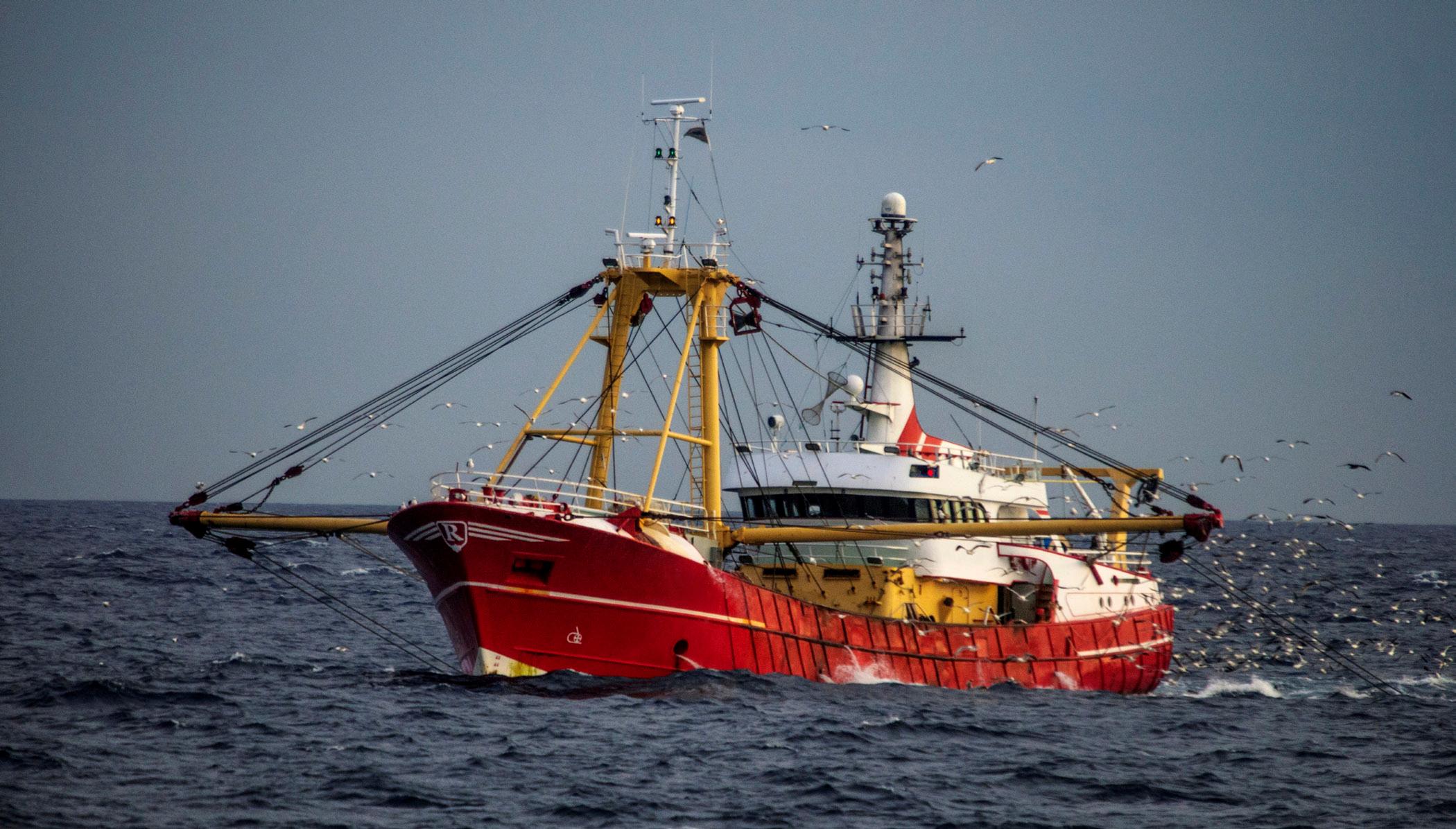
FALL 2022 | Oceana.org17
© Oceana/Juan Cuetos
A Dutch trawling vessel in Denmark seen during Oceana’s expedition to the North Sea in 2017. Oceana is campaigning to ban bottom trawling in EU MPAs.
If the EU wants to meet its ambitious biodiversity targets and be viewed as credible by the international community, it must ban bottom trawling in all MPAs immediately.
– Nicolas Fournier, Oceana Campaign Director
Making Progress
So why is the most destructive form of fishing allowed to occur in the most “protected” and productive parts of Europe’s ocean? Nicolas Fournier, Oceana’s Campaign Director for marine protection in Europe, explained that most of the MPAs in Europe do not include an outright ban on bottom trawling, or any activity for that matter.
An EU law requires impact assessments to be completed for activities that could undermine the conservation goals of an MPA, but those assessments are not routinely conducted for commercial fishing. In cases where assessments are done, bottom trawling is often only banned in smaller portions of an MPA — for instance, over particular reefs or seagrass meadows, but not in surrounding areas.
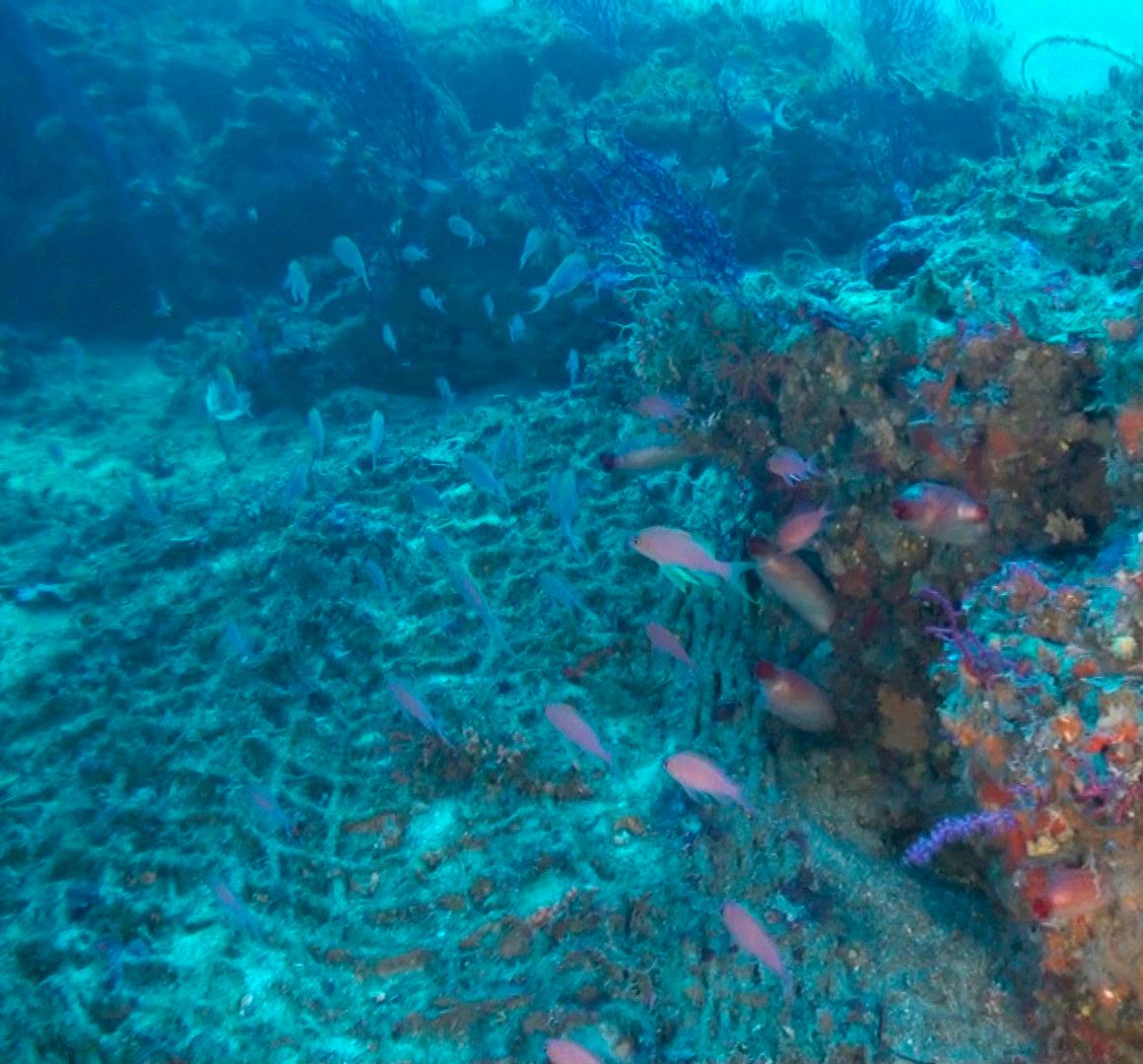
“We have examples of places where bottom trawling has been restricted in a very patchy manner,” Fournier said. “So you basically have dots on the map where you have small enclosures inside the MPA, but the broader MPA continues to be freely bottom trawlable.”
Another issue is that countries have up to six years to devise a management plan after designating an MPA, which enables political feet-dragging and affords industrial fishing interests the time to lobby against restrictions they find unfavorable, Fournier explained.
Fishing restrictions can also be easily blocked or delayed. The EU Common Fisheries Policy requires any proposed fishery closures in offshore MPAs — those located more than 12 nautical miles from shore — to receive the sign-off of every EU Member State that fishes in the area.

18 Feature © US Coast Guard
A trawl’s winch in the Port of Hirtshals in Northern Denmark. Oceana found in 2020 that destructive fishing methods, including bottom trawling, were occurring in 86% of European MPAs.
© Oceana/Juan Cuetos
A lost trawl net entangled on the seafloor in Fort d’en Moreu, Cabrera, Balearic Islands, Spain.
© Oceana
Despite these barriers, Oceana’s campaign to stop bottom trawling in MPAs across Europe is making progress. In May, the European Parliament adopted a non-binding amendment that called on the EU to prohibit “all extractive industrial activities” in MPAs. According to The International Union for Conservation of Nature (IUCN), which sets international standards for MPA management, the definition of industrial fishing includes “all fishing using trawling gears that are dragged or towed across the seafloor or through the water column.” This type of industrial activity is not compatible with MPAs, according to the IUCN.
Fournier explained that even though the European Parliament did not mention bottom trawling by name, the language they adopted makes a compelling case for ending bottom trawling in MPAs across the EU.
“In our view, this definition is much more ambitious because it calls to prohibit all industrial destructive
activities, which in our reading covers bottom trawling as well as other harmful fishing practices,” Fournier said. “If the EU wants to meet its ambitious biodiversity targets and be viewed as credible by the international community, it must ban bottom trawling in all MPAs immediately.”
This action by the European Parliament follows advocacy by Oceana and its allies. More than 170,000 people signed a petition to ban bottom trawling in MPAs, which was delivered to EU Commissioners at the end of 2021.
Progress is also being made in the UK, where bottom-towed fishing gear was used in 90% of offshore MPAs last year. Oceana recently secured a commitment from the government to manage bottom-towed fishing gear in its offshore MPAs by 2024. The UK is now taking steps toward this goal, having recently protected its largest sandbank, Dogger Bank, from bottom trawling. However, recent management proposals for
13 more MPAs indicate the UK’s Marine Management Organisation will only protect certain features from bottom trawling, rather than the entirety of the MPAs.
A window of opportunity has also opened up in the EU, which introduced a Nature Restoration Law with legally-binding targets to restore degraded habitats on land and at sea. This law could propel the EU to fulfill its currently non-binding goal of designating 10% of its waters as no-take zones by 2030.
Fournier said ambitions are high, but governing bodies may need an extra push to make real and lasting change — and that is where Oceana comes in.
“The EU is claiming to be a global leader in marine conservation, but in our own backyards, and in our own MPAs, bottom trawling continues,” Fournier said. “That’s what we’re fighting to change, so gems like the Wadden Sea can be protected — for good.”

FALL 2022 | Oceana.org19
The Wadden Sea, which borders Germany, Denmark, and the Netherlands, is known for its mudflats. Oceana found the Wadden Sea MPA in German waters endured an estimated 22,000 hours of apparent bottom trawling in 2021.
© Shutterstock/Bjoern Wylezich
Oceana’s victories over the last year
With the help of its allies, Oceana has won more than 25 victories in the last 12 months

U.S. state of California enacts boldest plastic pollution reduction policy in the nation
Canada eliminates production, sale, and export of six ocean-polluting single-use plastics
U.S. national parks protected from single-use plastics
U.S. state of Maine rejects permit for harmful fish farm
At-sea monitoring requirements will strengthen accountability and abundance of groundfish fishery in Northeast U.S.
New legal safeguards set by Canadian government will help rebuild fish stocks
Spain curbs ocean-polluting single-use plastics through new Waste Law
The Canadian government protects two critically depleted forage fish
Coca-Cola pledges to reduce single-use plastic bottles and increase reusable packaging, including refillable bottles
Norwegian insurance company Hydor ends coverage of three illegal fishing vessels
New law in U.S. state of New York will reduce plastic pollution in hotels
Mexico ushers in greater transparency by allowing public tracking of fishing vessel activity
Philippines government protects marine ecosystems and fishers from harmful coastal development projects
International Commission for the Conservation of Atlantic Tunas protects endangered North Atlantic shortfin mako shark from fishing for two years
Brazil agrees to publish vessel tracking data for its commercial fishing fleet
Major European marine insurance companies take action to deter illegal fishing
Major global insurance company AXA XL introduces transparency requirement for insured fishing vessels
General Fisheries Commission for the Mediterranean strengthens transparency requirements for fishing vessels
U.S. state of California enhances protections for endangered western Pacific leatherback sea turtles
U.S. President Joe Biden restores protections for critical marine habitat in New England
U.S. state of California enacts two laws that reduce single-use plastic waste
U.S. state of Delaware protects marine life, coast from plastic balloon pollution
Brazilian food ordering platform iFood commits to deliver plastic-free meals by 2025
U.S. expands critical habitat protections for endangered Southern Resident orcas
Brazil restores Fisheries Management Councils
U.S. state of California funding protects whales, dolphins, and sea turtles from deadly drift gillnets
U.S. government protects over 25,000 square miles (65,000 square kilometers) of New England deepsea corals from destructive fishing
Belize agrees to publish vessel tracking data for its commercial fishing fleet
20© Oceana/Carlos Minguell
Supporter Spotlight
The Becht Foundation is creating a more sustainable future
Since 2020, the Becht Foundation has partnered with Oceana to protect ocean habitat and to support the people and communities who depend on healthy and abundant oceans.
In just the past two years, this partnership has funded groundbreaking expeditions in the U.S. state of Alaska and Chile that bring to life for policymakers and the public unique marine ecosystems and the need for ocean conservation. A new anchor grant from the Foundation in 2021 allowed Oceana to expand its campaigns in the United Kingdom and open a full-time office in London. The Foundation is also collaborating on a partnership with Oceana Canada and the Only One Collective to develop a communications campaign to end overfishing in Canada and restore abundance to Canada’s wild fish. A core component of this work includes a nationwide digital marketing campaign aimed at mobilizing individuals to support and apply pressure to the Fisheries Ministry and Canadian government.
When Ann and Bart Becht founded the Foundation in 2006, they focused their efforts on mitigating

unnecessary human suffering around the world through areas such as humanitarian aid, education, and biodiversity. However, as they continued researching how they could have the most impact, it became increasingly evident that the way people were overexploiting the world’s natural resources was damaging the planet and would lead to increased human suffering. In 2019, they reassessed the purpose and direction of the charitable trust, resulting in a newfound focus on protecting and restoring biodiversity and fighting climate change with a heavy concentration on marine protection. They based this decision on the ability of ocean ecosystems to recover with the right interventions, the importance of oceans as a carbon sink, and the opportunity to have real and measurable impact with marine organizations like Oceana.
“Partnering with a science-based, campaign-driven organization like Oceana that achieves lasting policy change for the oceans around the world, helps broaden and deepen the Foundation’s reach and impact. Our partnership has bolstered our response to the urgent threats faced by ocean ecosystems and the people who depend on them for their livelihoods and well-being. We also know the marine space has been chronically underfunded, which is another reason it has become our focus,” Ann and Bart shared on their partnership with Oceana.
The Foundation’s impact in the environmental space comes from a place of experience and dedication to providing a meaningful philanthropic response to combating the many threats to our oceans. Through a collaborative approach with its partners, the Foundation drives systemic change, including the shared goal of creating 1.5 million square miles (4 million square kilometers) of protected marine ecosystems in the eastern Pacific Ocean.
Becht Foundation is a results-focused organization with the purpose of protecting and restoring our planet’s biodiversity through marine conservation. It supports three strategic areas within ocean conservation: (1) protecting 30% of the ocean by 2030, (2) fighting overfishing and destructive fishing; and (3) protecting coastal and marine ecosystems such as mangroves.
Thanks to Ann and Bart’s vision and commitment to conserving and protecting our ocean resources, together Oceana and the Foundation are creating a more sustainable future for the oceans and the people who depend on them. Find out more about Becht Foundation at bechtfoundation.org.
FALL 2022 | Oceana.org21
Ask Dr. Pauly

Why are plastics in the ocean so harmful?
Until the 1950s, the animals on Earth, including marine animals, primarily only had to deal with debris and trash in the form of organic substances or objects that were produced by, or derived from, plants or animals. This included wood, fiber, rotting flesh, bones, or other materials that could be degraded by bacteria and fungi, and thus turned back into nutrients or converted into harmless minerals. For eons, these microscopic organisms recycled organic matter on Earth and in our oceans, and quite literally kept our world clean.
This changed radically with the advent of plastics. Chemists consider plastics “organic” because, like most living substances, they consist of chains of carbon
atoms. However, most plastics are petroleum-derived, made from long chains of carbon atoms which have shapes bacteria never encountered in their 3 billion years of existence. Thus, every piece of plastic we throw away, from plastic bags to disposable razors to empty detergent bottles, could remain with us for centuries or longer.
Thus, while you can recycle aluminum infinitely, you can only downcycle plastics, i.e., turn highquality plastics, like the ones used to make disposable spoons, into low-quality plastics, like the kind used to make park benches (and we don’t need that many park benches).
However, it is far more likely plastic waste will end up in a landfill or in the environment, including ocean ecosystems.iii And when dealing with the oceans, it is useful to distinguish between two kinds of plastic pollutants: macro- and microplastics.
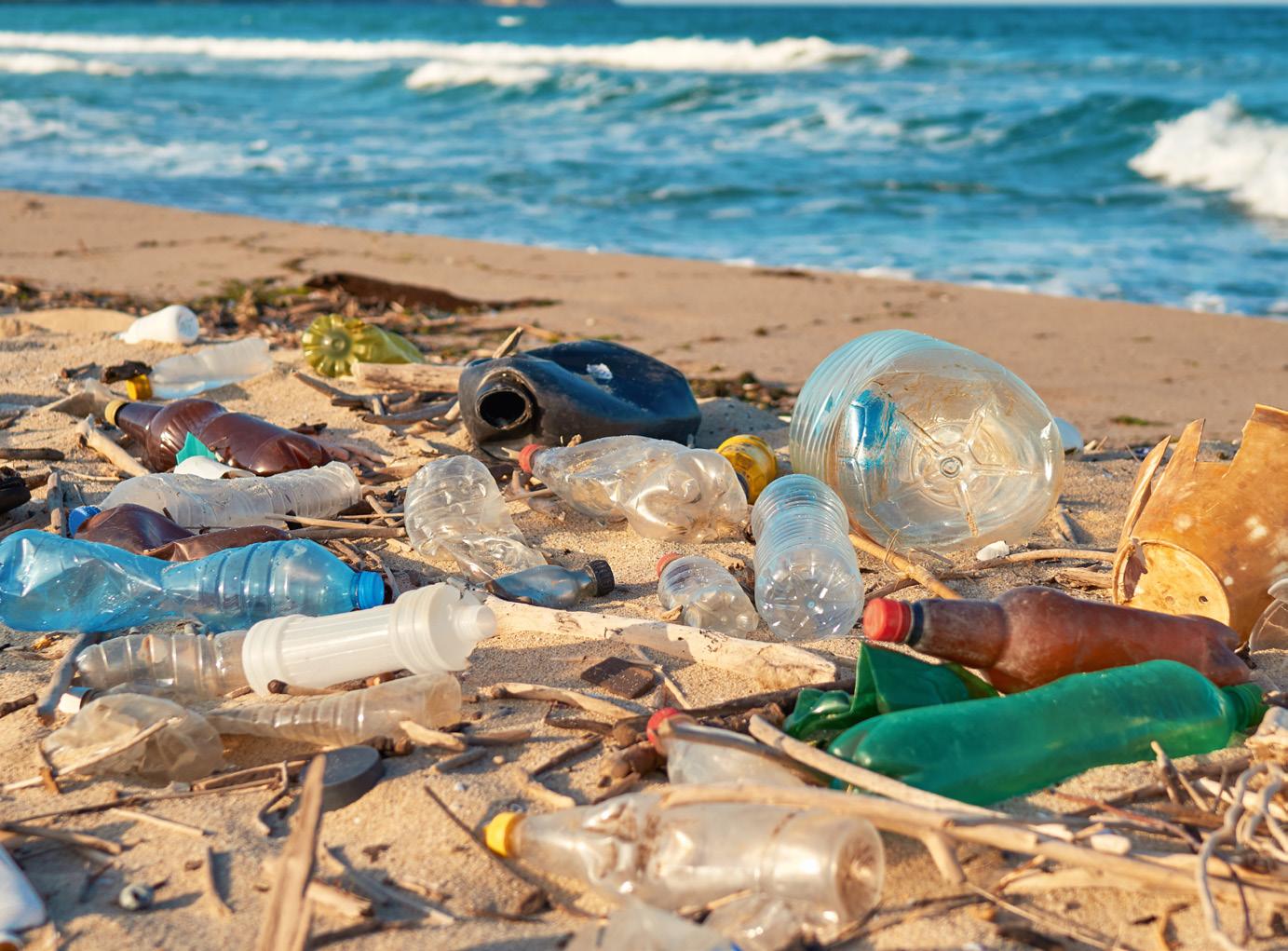
ii
Plastics can’t be burned safely because some of their carbon chains, under high temperatures, link up and form Frankenstein compounds, such as dioxins, which are highly toxic to all life, including humans.i And most plastics cannot be safely recycled because of the thousands of added chemicals — many of which are toxic and make their way into recycled products.
Macroplastics make up the junk that we see floating at or near the surface of the sea, where they
22
22
Dr. Daniel Pauly is the founder and principal investigator of the Sea Around Us project at the University of British Columbia’s Institute for the Oceans and Fisheries, as well as an Oceana Board Member.
Most plastics cannot be safely recycled. It is far more likely plastic waste will end up in a landfill or in the environment, including ocean ecosystems.
© Shutterstock/Larina Marina
have formed gigantic and steadily increasing “garbage patches” in the Atlantic, Indian, and Pacific oceans. This form of pollution is a growing threat to seabirds, sea turtles, whales, and other marine mammals because they may mistake macroplastics for food items and die in agony with bellies full of bulking, indigestible trash.iv
These animals can also entangle themselves in floating pieces of plastics and drown. In other cases, they can end up with rings of
plastic around their necks or bodies, which grotesquely maim them and cause immense suffering until they die of their suppurating wounds.
Even worse, because they are more insidious, are microplastics. These are tiny, often barely visible bits of plastic — like the ones shed from clothing in washing machines — which can now be found in all the world’s seas.
To fully understand what microplastics do, we must
appreciate another nasty property of long carbon chains: they make plastic lipophilic, which is a jargony way of saying plastics repel water (which is the reason why we make rain jackets with plastic fibers).
Now, it so happens that most of the worst poisons that the chemical industry produces — DDT, PCB, dioxins, etc. — happen to be lipophilic as well.
Thus, every bit of microplastic in the ocean acts as a minuscule sponge for the various poisons that the chemical and energy industries have disposed of via waterways or the air, and which have ended up in the sea, where they now accumulate.
So these chemicals stick to microfibers, turning them into tiny poison pills that end up being consumed by small, insectlike animals called zooplankton, which store lipophilic substances in the fat of their little bodies.v This is called bioaccumulation. Zooplankton are then consumed by small fish such as sardines and anchovies, which are then eaten by tuna and then…bon appétit!
This is why we must de-plastify the world, starting with the absurd waste that single-use plastic containers and utensils represent.

i https://www.sciencedirect.com/science/article/pii/S187802961630158X
ii https://ipen.org/documents/plastics-toxic-additives-and-circular-economy
iii https://www.science.org/doi/10.1126/sciadv.1700782#:~:text=We%20estimate%20that%208300%20million,landfills%20or%20the%20
iv https://usa.oceana.org/reports/choked-strangled-drowned-plastics-crisis-unfolding-our-oceans/
v https://www.sciencedirect.com/science/article/abs/pii/S0025326X12005942
FALL 2022 | Oceana.org23
23
Plastic found in sea turtle fecal matter. In 2020, Oceana found evidence of nearly 1,800 animals from 40 different species swallowing or becoming entangled in plastic since 2009 in the U.S.
© Gumbo Limbo Nature Center Inc.
natural%20environment
Our Ocean Conference
After a two-year postponement due to the Covid-19 pandemic, the island nation of Palau hosted the 7th annual Our Ocean conference in mid-April. As one of the largest gatherings of ocean leaders from around the globe, the conference is focused on generating commitments and actions that protect our oceans.
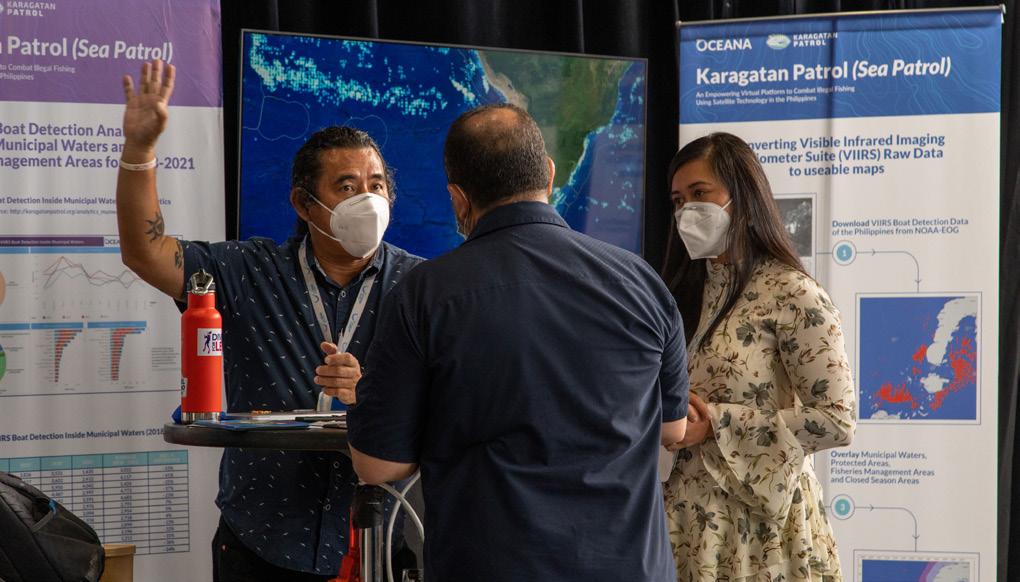


During this year’s event, Oceana partnered with Global Fishing Watch and Bloomberg Philanthropies to host an event titled, “The Role of Transparency in Addressing IUU Fishing and Human Rights Abuses.” Oceana’s Vice President for the United States, Beth Lowell, moderated a panel of experts who discussed the impacts of illegal, unreported, and unregulated (IUU) fishing and human rights abuses at sea, while also explaining how governments, civil society, and communities can leverage open data and technology to address these problems. The event included a special keynote from Monica Medina, assistant secretary for oceans and international environmental and scientific affairs at the U.S. State Department. Oceana Board Member and Lead of the Environment Program at Bloomberg Philanthropies, Antha Williams, also provided welcome remarks and announced the creation of a new global coalition to promote transparency in fisheries, which Oceana will co-lead with the Environmental Justice Foundation. Learn more at Oceana.org/Transparency.
Oceana also leveraged the conference to showcase Karagatan Patrol, a reporting platform for illegal fishing in the Philippines, which was formed by Oceana with support from local governments in the Philippines. The data is accessible on the Karagatan Patrol Facebook Group, which enables law enforcement and citizens to easily spot and report potential illegal fishing activities and hotspots in municipal waters.
24
Events
Oceana’s exhibit space showcased Karagatan Patrol, a new tool in the Philippines that helps the public report illegal fishing.
Oceana’s Vice President for the United States Beth Lowell, and Oceana Board Member and Lead of the Environment Program at Bloomberg Philanthropies Antha Williams.
Monica Medina, assistant secretary for oceans and international environmental and scientific affairs at the U.S. State Department, delivered remarks at Oceana’s event on IUU fishing.
© Oceana
Oceana
© Oceana
© Oceana
Los Angeles BoardMeeting and Reception
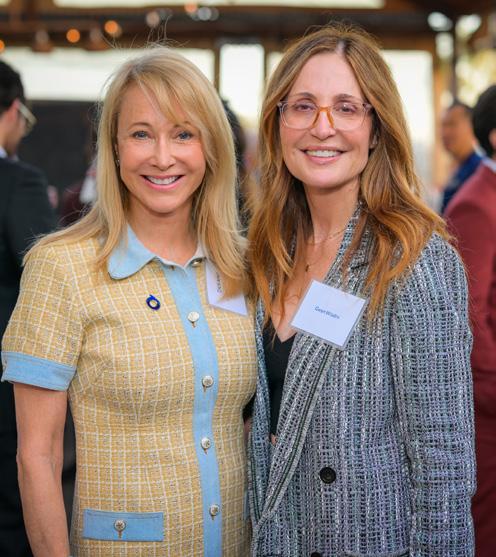





Oceana’s Board of Directors held its first in-person meeting since the onset of the Covid-19 pandemic. The meeting was held in Los Angeles, California in April and chaired by Sam Waterston. Following the meeting Oceana’s Board of Directors hosted a reception at The Eveleigh, a rustic farm-to-table restaurant on the Sunset Strip. Attendees included Oceana’s corporate and individual supporters, Oceana’s Board of Directors, Executive Committee, and celebrity supporters Christina Ochoa, Oscar Nunez, and Ursula Whittaker.
Waterston, Chair of Oceana’s Board, made opening remarks to attendees, noting, “I’m as proud of my association with this group of extraordinary people as I am of any association I’ve had with any group, for their character, talent, and for their commitment to getting things done for the ocean — which needs our help, now more than ever, and which responds wonderfully to decent treatment.”
Waterston explained his journey to joining Oceana. He felt powerless after finding out the New England cod fishery, which was once the dominant feature of the seascape from his childhood in Rhode Island and Massachusetts, had in fact collapsed first in the 1970s and again in 1992. That’s when he joined Oceana and found “a team to join to get things done about this great problem and opportunity, the health of our oceans.”
FALL 2022 | Oceana.org25
All photos by Oceana/Mariusz Jeglinski
Oceana supporters David and Linda Chou, and Oceana Board Chair Sam Waterston
Oceana Ocean Council Vice Chair Kelly Hallman and Oceana Board Members Susan and David Rockefeller
Actress Ursula Whittaker and Oceana supporter Janee Pennington
Oceana Board Member Valarie Van Cleave and Vitamin A CEO Gwyn Waidro
Oceana supporters Jaime Estatella and Natasha Pheko, and Oceana Board Members María Eugenia Girón and Loic Gouzer
Oceana Ocean Council Vice Chair Kelly Hallman, Oceana Board Member Maya Gabeira, and Oceana supporter Jim Hallman
Poached Shellfish Salad

with Fennel, Apple, and Thyme
Recipe by Fiona Lewis @DCFishwife
Chef’s Corner
© Fiona Lewis
How the Magnuson-Stevens Act helped transform U.S. Fisheries
In 1976, the United States Congress passed the Magnuson-Stevens Fishery Conservation and Management Act (MSA) to establish federal management of the nation’s fisheries and restrict fishing activities in U.S. waters. The law, which has undergone numerous changes in its 42-year history, has reversed the declining trend and helped rebuild dozens of fish stocks.
Today, Oceana and its allies work with policymakers to protect the integrity of the MSA and guard it against attacks from those who want to weaken the law.
Chef Fiona Lewis, an Oceana ally, said, “By protecting these federal laws, not only are we protecting recreational fisher people who want to go out and have fun on the ocean like I do, we’re also protecting those commercial fish families because that’s ultimately what we have to remember they usually are.”
Lewis operates The District Fishwife, a fullservice fishmonger that brings fresh and sustainable seafood to the Washington, DC metro area. “To me, sustainability is really important because I have a young family. And I want my family growing up to be able to eat and love the seafood that I’ve grown up with my whole life,” Lewis added.
Chef Fiona Lewis’ Poached Shellfish Salad with Fennel, Apple, and Thyme
Serves: 2 Time: 30 minutes
For the poaching broth
3 cups shrimp stock, can substitute clam juice
1 tablespoon table salt
1 cup dry white wine
4 sprigs of thyme
1/4 stick of unsalted butter
For the dressing
1/4 cup EVOO 2 tablespoons white wine vinegar
1 teaspoon picked thyme leaves
1 tablespoon of capers minced
1/2 teaspoon of lemon zest 2 tablespoons of lemon juice
A pinch of salt and pepper
Instructions
Ingredients*
8 little neck clams
½ lb muscles (optional)
6 pieces 10/20 size dry scallops
8 pieces of 16/20 shrimp peeled
1/2 a fennel bulb shaved or thinly sliced on a mandolin (reserve some fronds for serving)
1/2 a bibb lettuce or romaine lettuce
1/4 Fuji or honeycrisp apple sliced thin
Fiona Lewis operates The District Fishwife with her partner Ben Friedman in Washington, DC. Fiona and Ben share a passion for all things aquatic and a commitment to promoting healthy and abundant oceans for future generations.
Fiona Lewis is the founder and co-owner of three businesses in DC’s Union Market: The District Fishwife, On Toast, and Son of a Fish. She is a nationally recognized expert on sustainable seafood, conservation of local fish species, and an advocate for regional fisheries.

• In a small pot bring the poaching stock to a low simmer. Add the clams and set a timer for four minutes. Keep on a low simmer and at the four-minute mark add the mussels and watch the pot as the clams and mussels open sufficiently (within the next minute or so).
• Remove them and set aside on a plate to cool. Discard any clams or mussels that didn’t open.
• Add the scallops to the poaching liquid, set a timer for one minute. Then add the shrimp and set another timer for one minute.
• When the timer goes off, remove the scallops and shrimp and allow to cool with the mussels and clams. Remove all the shells from the mussels and clams.
• Leave the seafood on a plate to cool down to room temperature.
• For the dressing combine all ingredients in a container and shake vigorously.
• To assemble, place lettuce on the plate, scatter the apple around followed by the fennel. Once the seafood has reached room temperature, plate the seafood and drizzle with dressing and garnish with remaining fennel fronds.
* Ask your local fishermonger about to how to source seafood sustainably, or consult a sustainability guide such as SeafoodWatch.org.
FALL 2022 | Oceana.org27
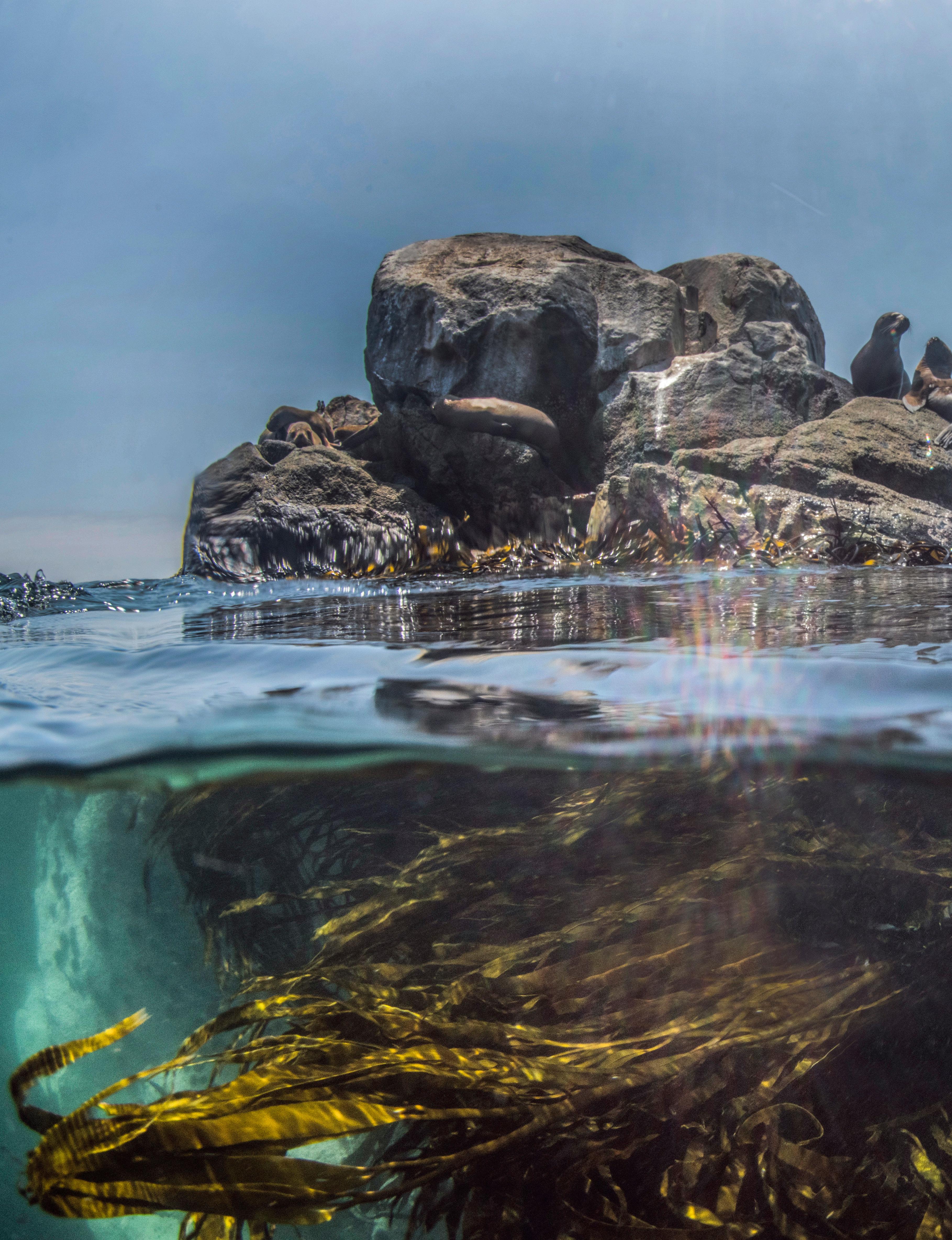
28© Oceana/Mauricio Altamirano
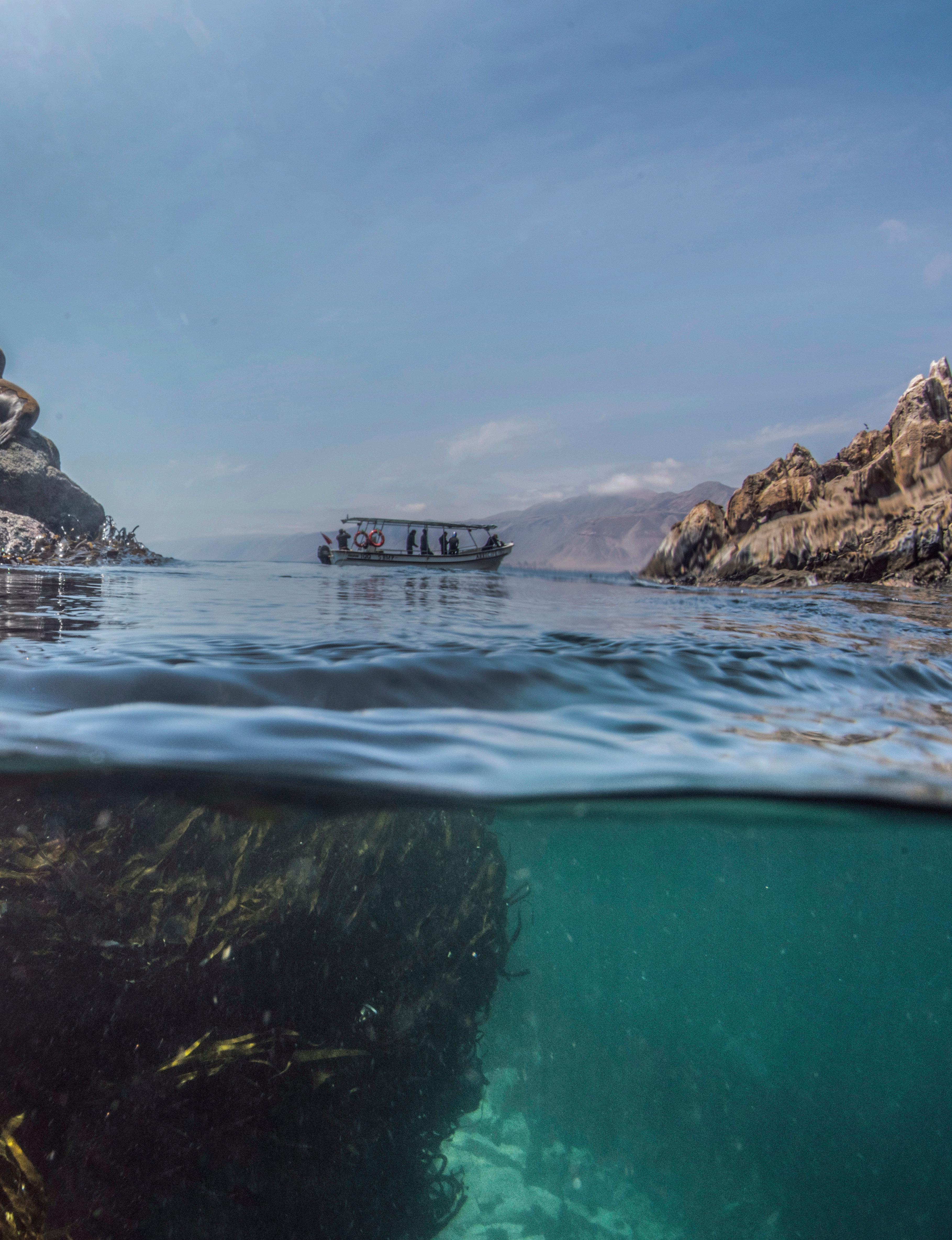
FALL 2022 | Oceana.org29
Sea lions sunbathe in Pisagua, Chile. Oceana has conducted four expeditions to Pisagua and documented over 150 species and abundant kelp forests. Many artisanal fishermen in the area rely on this richly biodiverse area to support their community and local economy. Oceana is campaigning to protect this important area.

Global headquarters: Washington, D.C. Asia: Manila Europe: Brussels | Copenhagen | Madrid | Geneva | London North
America: Belmopan
| Ft. Lauderdale |
Juneau
| Halifax | Mexico City | Monterey | New York | Ottawa | Portland | Toronto South America: Brasilia | Santiago | Lima Go to oceana.org and give today. 1025 Connecticut Ave NW, Suite 200 Washington, DC 20036 USA phone: +1.202.833.3900 toll-free: 1.877.7.OCEANA You can help Oceana fight to restore our oceans with your financial contribution. Call us today at +1.877.7.OCEANA, go to our website oceana.org/give and click on “give today,” or use the envelope provided in this magazine. You can also invest in the future of our oceans by remembering Oceana in your will. Please contact us to find out how. All contributions to Oceana are tax deductible. Oceana is a 501(c)(3) organization as designated by the U.S. Internal Revenue Service. Oceana’s accomplishments wouldn’t be possible without the support of its members. A group of wrasses found in Juan Fernandez Archipelago, Chile. ©
Oceana/Eduardo
Sorensen















 By Emily Petsko
New law will reduce single-use plastic packaging and foodware in state by at least 25% over the next decade.
By Emily Petsko
New law will reduce single-use plastic packaging and foodware in state by at least 25% over the next decade.






























